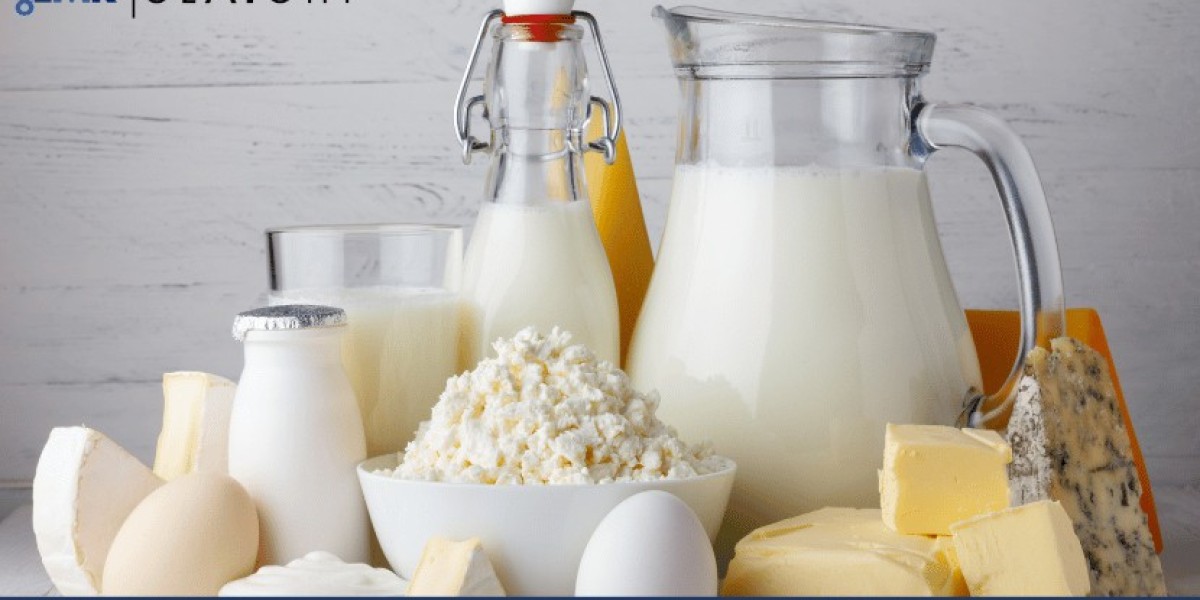The Kerala dairy market is a vibrant sector integral to the state's economy, characterized by its cooperative model epitomized by the Kerala Cooperative Milk Marketing Federation (KCMMF), known as Milma. With a strong emphasis on local production, it ensures the livelihood of thousands of small-scale farmers by providing a stable market for their milk. The market is known for its wide range of dairy products, including milk, yogurt, and traditional sweets, catering to the diverse tastes of the Kerala population. The sector's focus on quality, sustainability, and empowerment of local communities sets it apart, making it a key player in India's dairy industry.
Market Overview
The Kerala dairy market is characterized by its cooperative-led framework, prominently through the Kerala Cooperative Milk Marketing Federation (KCMMF) or Milma. This structure supports local dairy farmers by ensuring fair pricing and market access, fostering sustainability and community development. Kerala's dairy industry focuses on producing a variety of high-quality dairy products like milk, curd, and ghee, catering to the state's substantial consumer demand. The emphasis on local production, coupled with initiatives for quality and innovation, has made Kerala a significant player in India's broader dairy sector, contributing to its economic resilience and agricultural sustainability.
Kerala Dairy Market Size and Growth
In 2023, the Kerala dairy market achieved a significant milestone, reaching a volume of nearly 2.2 billion litres, showcasing its substantial role in the regional economy. Looking ahead, the industry is poised for further expansion, with expectations of steady growth from 2024 to 2032. This anticipated growth is reflective of increasing demand for dairy products within the state, driven by population growth, rising income levels, and a growing appreciation for the quality and variety of dairy products produced locally. The sector's future growth prospects highlight its critical contribution to Kerala's agricultural and economic development.
Kerala Dairy Market Trends
The Kerala dairy market is witnessing several key trends that are shaping its growth and development:
Request Sample: https://www.expertmarketresearch.com/reports/kerala-dairy-market/requestsample
1. Shift towards Value-added Products: There is a growing consumer preference for value-added dairy products such as flavored milk, yogurt, cheese, and ice cream. This trend is driven by changing lifestyle patterns, increased health consciousness, and a preference for convenience.
2. Focus on Quality and Sustainability: Consumers are increasingly looking for products that are not only high in quality but also produced in an environmentally sustainable and ethical manner. This has led dairy producers to adopt more organic farming practices and ensure better welfare for the cattle.
3. Technological Advancements: The integration of technology in dairy farming and processing is improving efficiency, product quality, and traceability. Innovations such as automated milking systems, advanced packaging solutions, and blockchain for supply chain transparency are becoming more prevalent.
4. Expansion of Retail and Distribution Networks: With the rise of online grocery shopping and the expansion of supermarket chains, the distribution channels for dairy products in Kerala are becoming more diversified, increasing accessibility for consumers.
5. Government Support and Cooperative Growth: The government and cooperative movements like Milma play a crucial role in supporting the dairy sector through various schemes, subsidies, and training programs for farmers. This helps in stabilizing milk prices and ensuring fair compensation for dairy farmers.
Market Opportunities and Challenges
Opportunities:
1. Rising Demand: The increasing population and changing dietary preferences offer a significant growth opportunity for the dairy sector. The demand for dairy products, especially value-added items, is expected to rise steadily.
2. Value Addition: There is room for innovation in dairy product offerings, such as introducing new flavors, packaging, and healthier options. Value-added products like flavored milk, probiotic yogurt, and specialty cheeses have strong growth potential.
3. Export Potential: Kerala's dairy industry can explore export opportunities, particularly for products with a niche market abroad. High-quality and organic dairy products have the potential to attract international buyers.
4. Technology Adoption: Embracing modern technology in dairy farming and processing can lead to increased productivity and efficiency. Automation, data analytics, and IoT applications can optimize operations.
5. Government Support: Continued government support through subsidies, infrastructure development, and training programs can further boost the sector's growth and stability.
Challenges:
1. Seasonal Variability: Kerala's climate can lead to seasonal fluctuations in milk production, affecting the supply chain's consistency and pricing.
2. Quality Control: Maintaining consistent quality standards, especially in small-scale dairy farms, can be challenging. Ensuring adherence to hygiene and safety standards is crucial.
3. Competition: The Kerala dairy market faces competition from both local and national brands. Staying competitive in terms of pricing and product innovation is a constant challenge.
4. Sustainability: Balancing dairy production with sustainability practices, such as reducing the environmental impact and ensuring animal welfare, requires investments and adherence to best practices.
5. Supply Chain Efficiency: Improving the supply chain, including transportation and cold storage facilities, is essential to minimize wastage and ensure product freshness.
Market Dynamics
The dynamics of the Kerala dairy market are influenced by various factors that shape its functioning and growth:
1. Cooperative Model: The Kerala Cooperative Milk Marketing Federation (KCMMF), known as Milma, plays a central role in the market. It operates on a cooperative model, involving numerous dairy farmers, ensuring fair pricing, and providing a stable market for their milk.
2. Local Production: Kerala places a strong emphasis on local dairy production, supporting the livelihoods of thousands of small-scale farmers. This focus on indigenous production contributes to the state's self-sufficiency in dairy products.
3. Demand-Supply Balance: The market strives to maintain a balance between milk production and consumer demand. Seasonal fluctuations in milk production are common due to Kerala's climate, leading to the need for effective supply chain management.
4. Quality Assurance: Quality is a paramount concern in the Kerala dairy market. Milma and other dairy cooperatives enforce strict quality standards, ensuring that consumers receive safe and high-quality dairy products.
5. Product Diversity: The market offers a wide range of dairy products, including milk, yogurt, ghee, and traditional sweets, catering to the diverse tastes of the Kerala population. This diversity enhances consumer choices and market competitiveness.
6. Consumer Preferences: Consumer preferences for value-added dairy products, organic options, and health-conscious choices influence market trends and product innovation.
7. Government Support: Government initiatives and subsidies play a significant role in supporting dairy farmers and stabilizing milk prices, contributing to market stability.
8. Technological Advancements: The integration of technology in dairy farming and processing improves efficiency, traceability, and product quality. Automation, data analytics, and modern packaging solutions are increasingly adopted.
9. Competition: The market faces competition from both local and national dairy brands. Competition encourages innovation and ensures that consumers have access to a variety of dairy products.
10. Sustainability: Sustainability practices, such as organic farming and environmentally responsible dairy production, are gaining importance in response to consumer and global trends.
11. Export Potential: Kerala's high-quality dairy products have export potential, presenting an opportunity for market expansion beyond the state's borders.
Media Contact
Company Name: Claight Corporation
Contact Person: John Walker, Corporate Sales Specialist – U.S.A.
Email: sales@expertmarketresearch.com
Toll Free Number: +1-415-325-5166 | +44-702-402-5790
Address: 30 North Gould Street, Sheridan, WY 82801, USA
Website: https://www.expertmarketresearch.com







